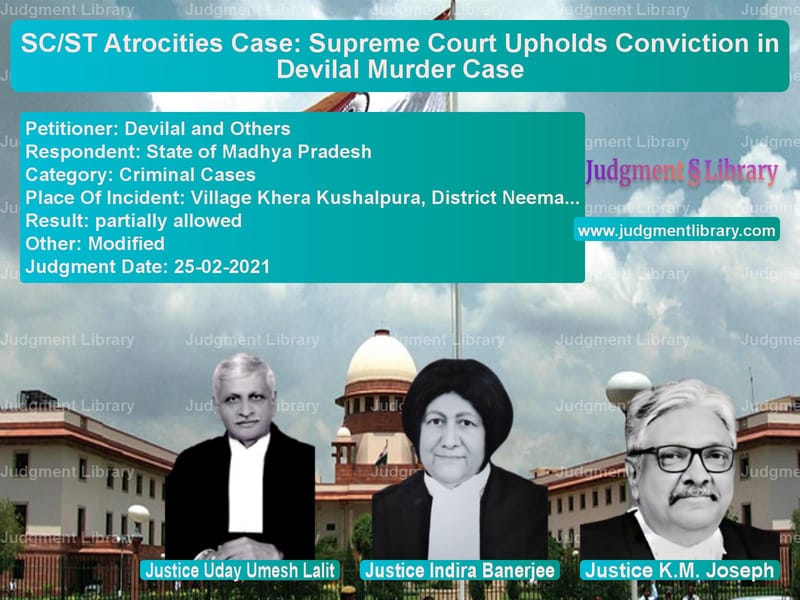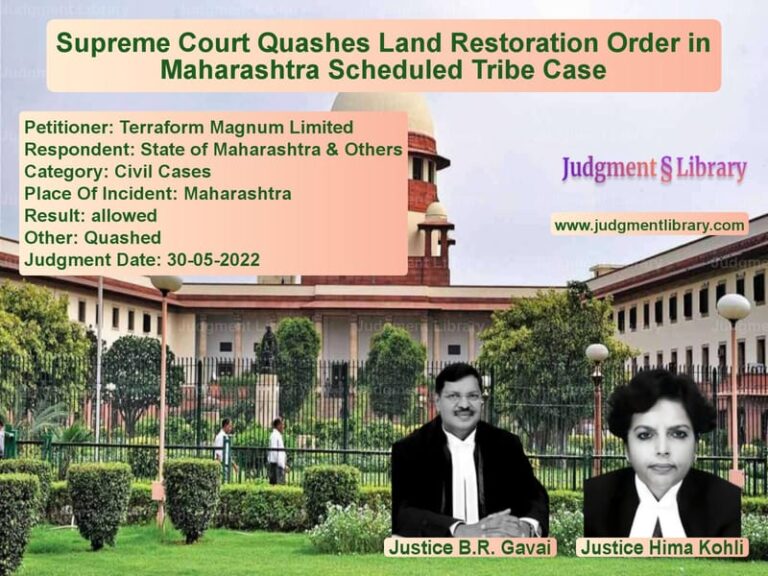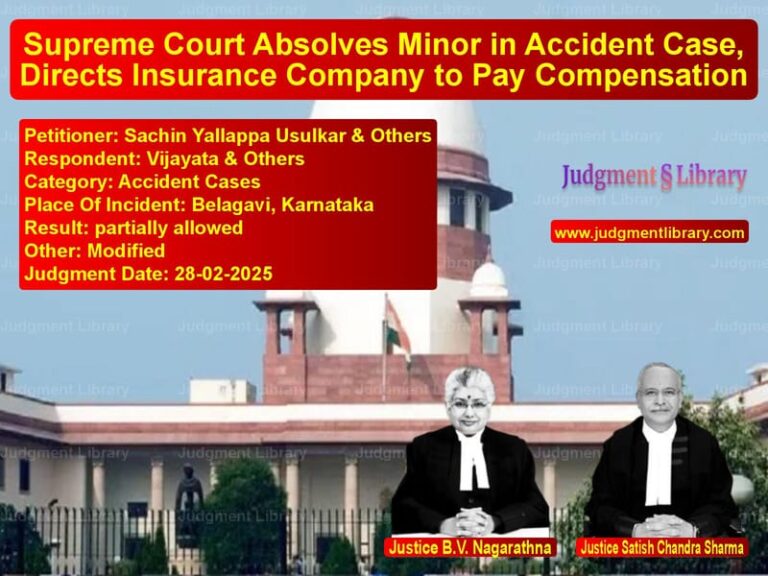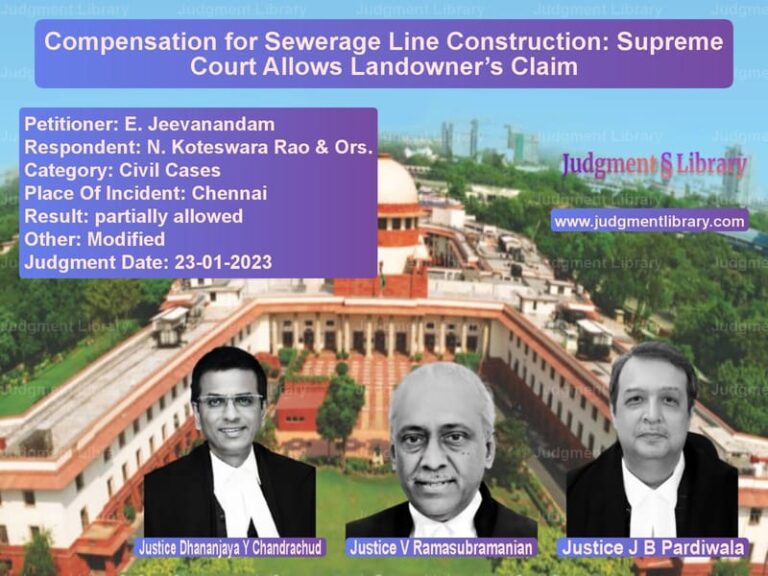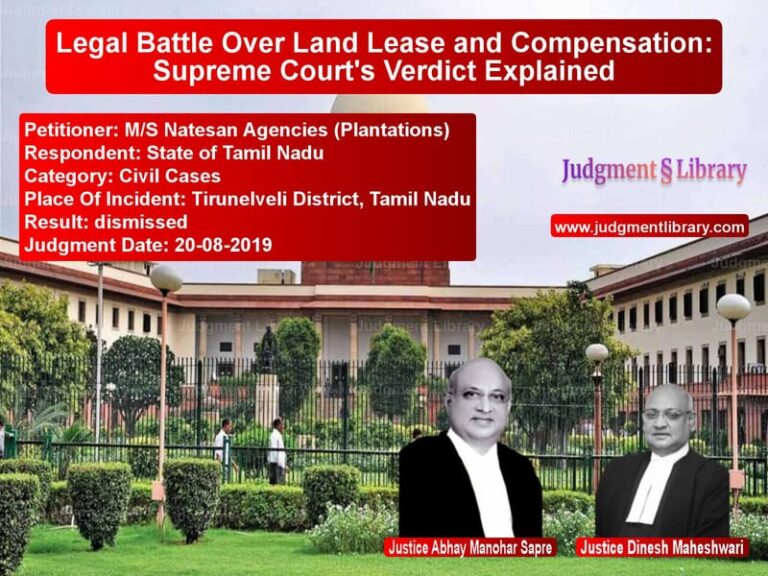SC/ST Atrocities Case: Supreme Court Upholds Conviction in Devilal Murder Case
The case of Devilal and Others v. State of Madhya Pradesh is a significant judgment involving charges under the Indian Penal Code (IPC) and the Scheduled Castes and Scheduled Tribes (Prevention of Atrocities) Act, 1989 (SC/ST Act). The Supreme Court had to decide whether the accused were rightly convicted under Section 302 read with Section 34 IPC and whether the conviction under the SC/ST Act was justified. Another crucial issue was the claim of juvenility by one of the accused, Amrat Ram.
The case arose from an incident that took place on July 19, 1998, in Village Khera Kushalpura, District Neemach, Madhya Pradesh. The victim, Ganeshram, was brutally attacked by the accused with deadly weapons, resulting in his death. The Trial Court convicted the accused for murder, which was upheld by the High Court. The present appeal was filed before the Supreme Court challenging the conviction.
Background of the Case
The incident began with a dispute between the victim, Ganeshram, and the accused, Devilal, over a previous altercation. On the evening of July 19, 1998, when Ganeshram was walking home, he was confronted by Devilal, his sons Gokul and Amrat Ram, and his wife Gattubai. The accused hurled caste-based abuses at Ganeshram and launched a violent attack:
Read also: https://judgmentlibrary.com/supreme-court-rejects-plea-of-juvenility-in-1982-murder-case/
- Devilal struck Ganeshram with a kulhari (axe) on his right leg.
- Gokul attacked him with a sword on his left leg.
- Amrat Ram assaulted him with a lathi (wooden stick), fracturing his right hand.
The attack left Ganeshram critically injured. His mother, wife, and sister-in-law intervened and took him home. He was later transported to the police station and then to the hospital, where he succumbed to his injuries.
Trial Court Proceedings
The prosecution relied on eyewitness testimonies and medical evidence. Key witnesses included:
- PW1 – Sajan Bai: Wife of the deceased, who witnessed the attack.
- PW2 – Saman Bai: Sister-in-law of the deceased, who was also present at the scene.
- PW7 – Laxminarayan: Brother of the deceased, who corroborated the events.
- PW9 – Dr. Kailash Chandra Kothari: The medical examiner who conducted the postmortem.
Dr. Kothari’s postmortem report revealed multiple incised wounds on both legs, fractured bones, and severe internal bleeding, leading to death due to excessive blood loss.
Based on the evidence, the Trial Court convicted Devilal, Gokul, and Amrat Ram under Section 302 read with Section 34 IPC, sentencing them to life imprisonment. Gattubai was acquitted due to a lack of evidence.
Arguments in the High Court
The accused appealed to the Madhya Pradesh High Court, raising the following arguments:
- The FIR was unreliable because the victim was critically injured and unlikely to have made a statement.
- The prosecution witnesses were tutored and gave inconsistent statements.
- The accused acted in self-defense and did not intend to commit murder.
The High Court rejected these arguments and upheld the Trial Court’s verdict, confirming the conviction and sentence of life imprisonment.
Supreme Court’s Analysis
When the case reached the Supreme Court, the appellants reiterated their arguments, particularly questioning the credibility of the victim’s dying declaration and the testimonies of eyewitnesses.
Key Findings of the Supreme Court
The Supreme Court examined the case under the following aspects:
1. Reliability of the Dying Declaration
The FIR was based on the victim’s statement before he succumbed to his injuries. The defense argued that Ganeshram was unconscious and could not have spoken. However, the Court ruled:
“The testimony of PW9-Dr. Kothari shows that Ganeshram was alive when he was examined. The claim that he could not speak remains an opinion and not a conclusive fact.”
Thus, the FIR was considered a valid dying declaration.
2. Credibility of Witness Testimonies
The defense argued that PW1 and PW2 were tutored witnesses. However, the Court noted:
“Even if PW1’s testimony is excluded, PW2’s deposition, along with the dying declaration, is sufficient to establish guilt.”
3. Recovery of Weapons
The police recovered a sword, an axe, and a lathi from the accused, matching the injuries on the victim. This further corroborated the prosecution’s case.
Juvenility Claim of Amrat Ram
During the appeal, Amrat Ram claimed that he was a juvenile at the time of the offense. The Supreme Court directed the Sessions Judge to verify his age. The inquiry confirmed that he was 16 years and 11 months old on the date of the crime.
Under the Juvenile Justice (Care and Protection of Children) Act, 2000, the age of juvenility was raised to 18 years. The Court ruled:
“Since Amrat Ram was below 18 years, his sentence must be modified under the Juvenile Justice Act.”
Final Judgment
The Supreme Court’s ruling:
- Confirmed the conviction of Devilal and Gokul under Section 302 IPC, sentencing them to life imprisonment.
- Modified the sentence of Amrat Ram, remanding his case to the Juvenile Justice Board for an appropriate penalty.
- Directed Devilal and Gokul to surrender within two weeks, failing which they would be arrested.
Legal Implications
This judgment highlights several legal principles:
- Dying Declarations: Statements made by a dying victim can serve as primary evidence if proven reliable.
- SC/ST Act Charges: Mere caste-based abuse does not automatically attract SC/ST Act provisions unless intent to humiliate based on caste is established.
- Juvenility Claims: Even after conviction, an accused can claim juvenility if evidence supports it.
The ruling reinforces the importance of witness credibility, medical evidence, and procedural fairness in criminal trials.
Petitioner Name: Devilal and Others.Respondent Name: State of Madhya Pradesh.Judgment By: Justice Uday Umesh Lalit, Justice Indira Banerjee, Justice K.M. Joseph.Place Of Incident: Village Khera Kushalpura, District Neemach, Madhya Pradesh.Judgment Date: 25-02-2021.
Don’t miss out on the full details! Download the complete judgment in PDF format below and gain valuable insights instantly!
Download Judgment: devilal-and-others-vs-state-of-madhya-prad-supreme-court-of-india-judgment-dated-25-02-2021.pdf
Directly Download Judgment: Directly download this Judgment
See all petitions in Murder Cases
See all petitions in SC/ST Act Case
See all petitions in Judgment by Uday Umesh Lalit
See all petitions in Judgment by Indira Banerjee
See all petitions in Judgment by K.M. Joseph
See all petitions in partially allowed
See all petitions in Modified
See all petitions in supreme court of India judgments February 2021
See all petitions in 2021 judgments
See all posts in Criminal Cases Category
See all allowed petitions in Criminal Cases Category
See all Dismissed petitions in Criminal Cases Category
See all partially allowed petitions in Criminal Cases Category

